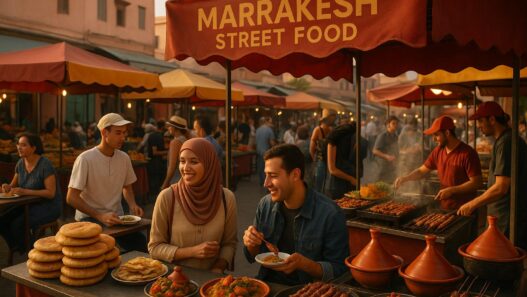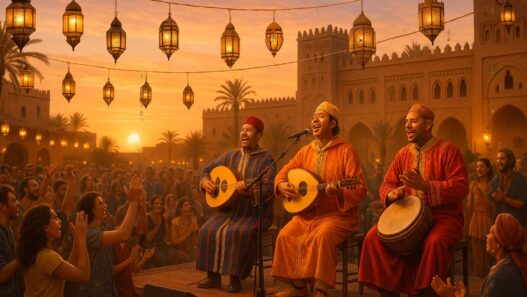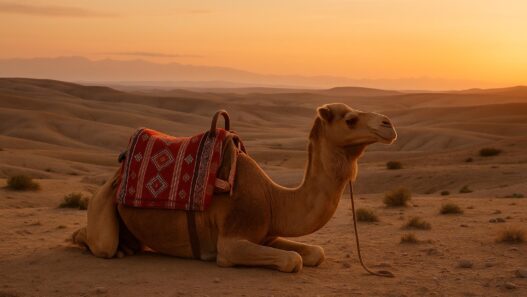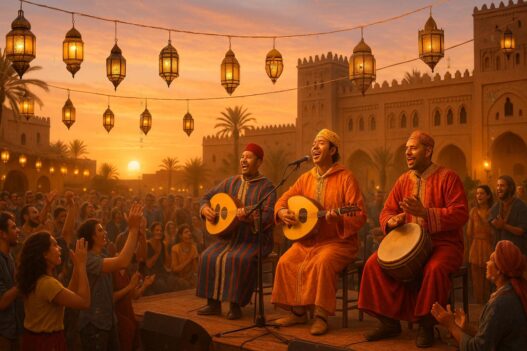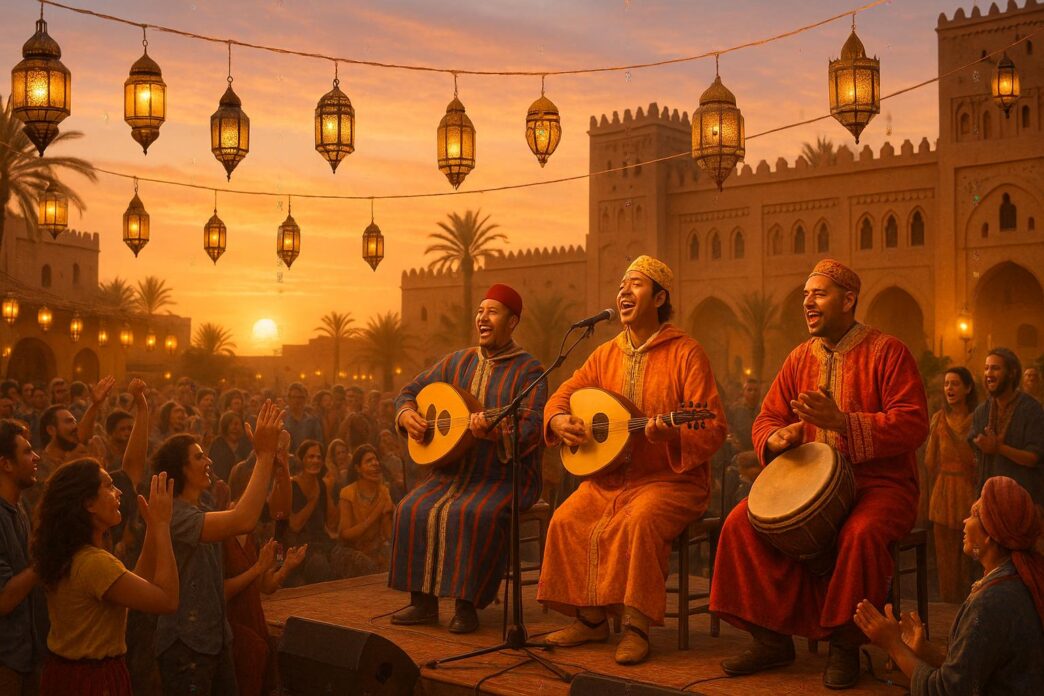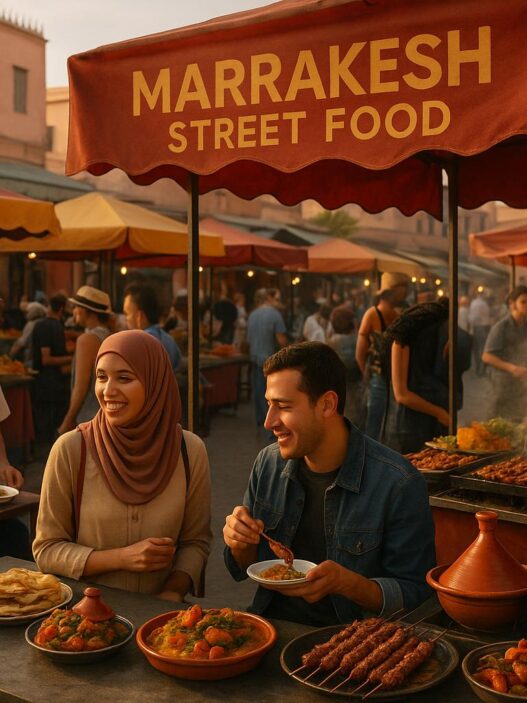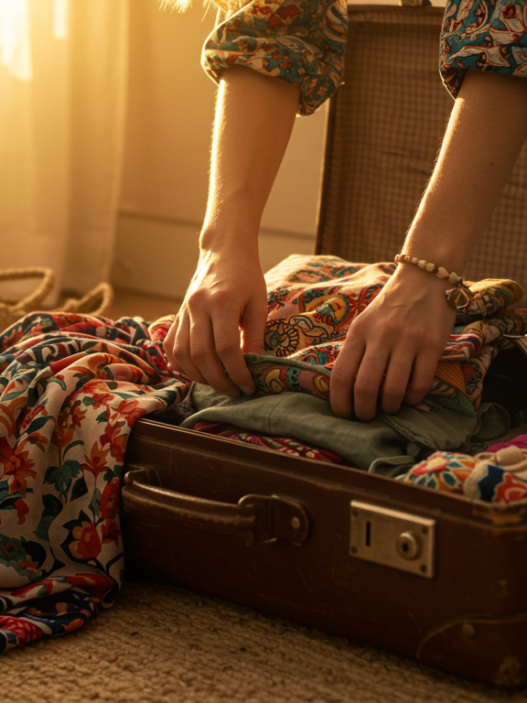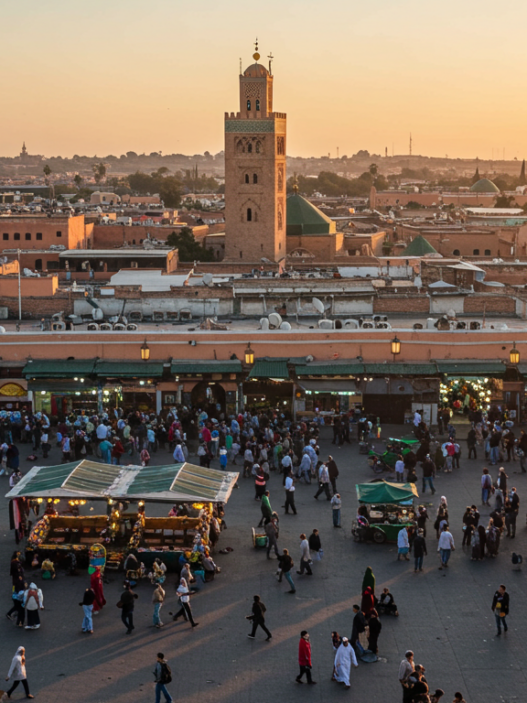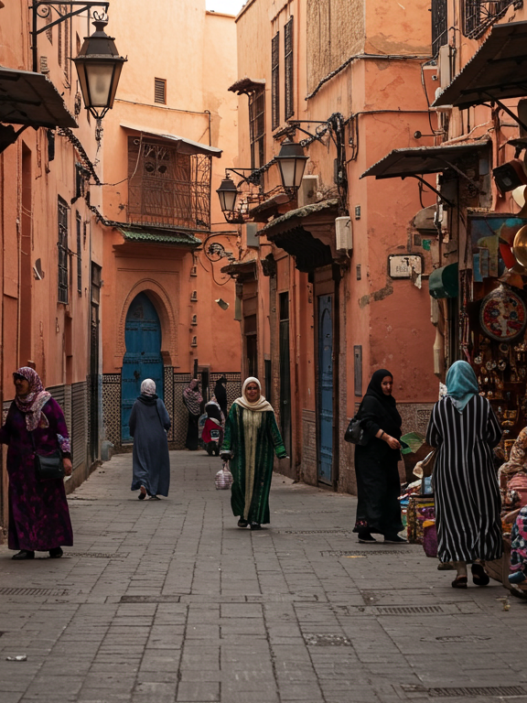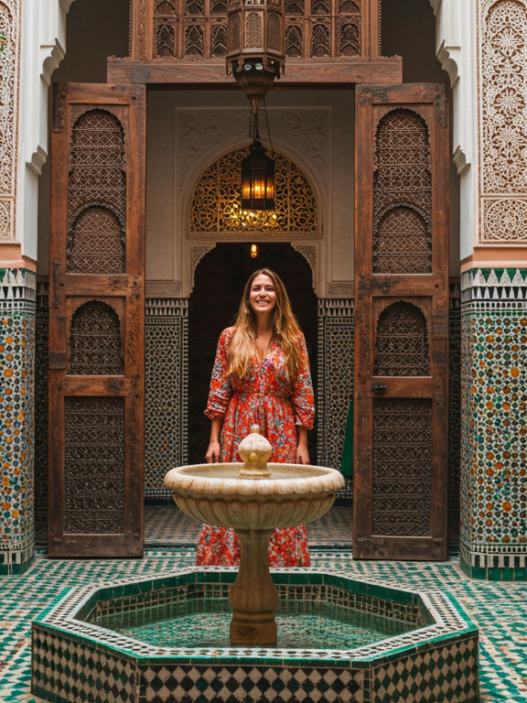Moroccan music festivals blend ancient traditions with modern sounds, offering unforgettable experiences for attendees. From the hypnotic rhythms of Gnawa music to the energy of contemporary genres like pop and rap, these festivals showcase the diverse heritage of Morocco. They also attract millions of visitors annually, boosting local communities and preserving musical legacies.
Key Highlights:
- Top Festivals: Mawazine (Rabat), Gnaoua World Music Festival (Essaouira), and Festival National des Arts Populaires (Marrakech).
- Cultural Fusion: Enjoy a mix of Berber, Arab, and sub-Saharan influences alongside global music styles.
- Visitor Tips: Book early, pack sun protection, and respect local customs for a smooth experience.
- Dates to Note: Mawazine 2025 is scheduled for June 20–28.
Whether you’re drawn to spiritual Gnawa rhythms or modern jazz, Morocco’s festivals offer a rare opportunity to connect with its rich musical traditions. Plan ahead to make the most of your visit.
Festival National des Arts Populaires 2024 | A Cultural Journey in Marrakech 🎶 🇲🇦
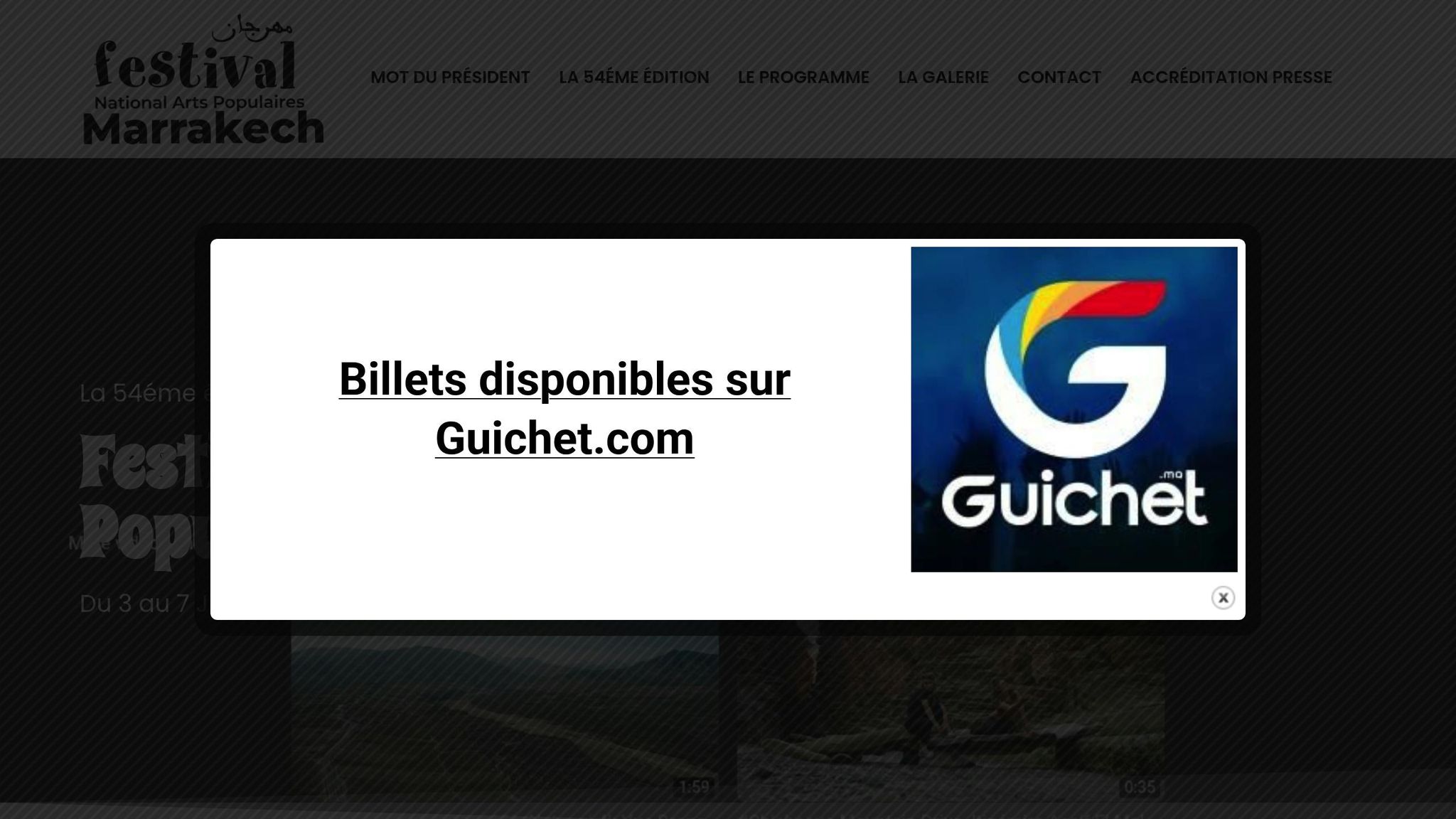
History and Development of Moroccan Music Festivals
Over the years, Morocco’s music festivals have grown from modest community gatherings into massive events that attract millions of attendees from around the world. This transformation is deeply rooted in the country’s rich cultural traditions, which have been elevated to global prominence.
Roots in Local Traditions
Morocco’s vibrant festival culture owes its origins to small, local gatherings tied to religious ceremonies, seasonal celebrations, and social rituals. A key influence has been Gnawa music, which emerged from spiritual healing ceremonies and became a cornerstone of these events.
Traditional moussems – religious festivals – and local celebrations played a vital role in preserving Morocco’s musical heritage. These events not only passed down stories and traditions but also strengthened social bonds across generations. The contributions of the Amazigh (Berber) communities, with their rich folk music traditions, were particularly important in shaping the country’s festival identity. These humble beginnings laid the groundwork for the internationally renowned festivals we see today.
Rise of Global Festivals
Building on these historical traditions, Moroccan music festivals began to gain global recognition in the late 1990s and early 2000s. A turning point came in 1998 with the creation of the Gnaoua World Music Festival by Moroccan entrepreneur Neila Tazi and her A3 Groupe. This event transformed local Gnawa music gatherings into a global phenomenon.
"The festival was established to promote the traditional Gnawa music and culture, which originated from the descendants of West African enslaved people brought to Morocco between the 16th and 17th centuries."
The festival’s international reputation soared in 2003 when jazz icon Randy Weston highlighted Gnawa music as the spiritual foundation of African-American jazz.
Another milestone came with the launch of the Mawazine Festival in 2001, initially focused on world music and organized by Maroc Cultures. The festival experienced a significant boost in 2008 when King Mohammed VI extended his royal patronage.
"Everything changed when King Mohammed VI extended royal patronage to the budding festival. This pivotal relationship unlocked resources and prestige that catapulted Mawazine onto the global stage."
By 2019, Mawazine had become the second-largest music festival in the world, drawing 2.75 million attendees – second only to Vienna’s Donauinselfest. That year, it featured performances by global stars such as Karol G, Maluma, Travis Scott, and Rosalía. Meanwhile, the Gnaoua World Music Festival continues to draw up to 500,000 visitors annually over its four-day run.
The global recognition of these festivals has been further cemented by UNESCO. In 2009, the Gnaoua World Music Festival was acknowledged as part of efforts to protect intangible cultural heritage. Later milestones included the inscription of Gnawa music on UNESCO‘s Representative List of the Intangible Cultural Heritage of Humanity in 2019 and Essaouira joining UNESCO‘s network of creative cities in 2020.
Despite challenges, such as the COVID-19 pandemic, these festivals have shown remarkable resilience. In 2024, the Mawazine Festival announced its return for its 19th edition after a three-year hiatus, highlighting the enduring cultural and global appeal of Morocco’s music festival scene.
Major Moroccan Music Festivals
Morocco is a haven for music enthusiasts, offering a vibrant array of festivals that celebrate everything from global sounds to cherished local traditions. These events, which range from grand international showcases to intimate cultural gatherings, provide a glimpse into Morocco’s rich and dynamic musical heritage. Here’s a closer look at some of the country’s most celebrated music festivals.
Mawazine Festival (Rabat & Salé)
Known as "Rhythms of the World", Mawazine is one of the biggest music festivals on the planet. In 2019, it attracted an astonishing 2.75 million attendees, making it the second-largest festival worldwide, just behind Vienna’s Donauinselfest. The event featured 90 acts spread across seven stages, highlighting its impressive scale.
What makes Mawazine stand out is its diverse lineup. The festival embraces a wide range of genres, including pop, rock, hip-hop, electronic, jazz, Latin, R&B, EDM, traditional Moroccan music, Amazigh, Chaabi, and reggae. Most performances – 90%, in fact – are free, taking place at various venues in Rabat and Salé, from open-air stages to historic landmarks. Under the patronage of King Mohammed VI, Mawazine is organized by the Maroc Cultures Association, a non-profit established in 2001.
If you’re planning ahead, the 2025 edition is set for June 20–28. Ticket prices range from 300–1,200 MAD ($30–$120) for premium access, while a full pass costs around $1,300. The festival also nurtures local talent through its "Generation Mawazine" program, which supports emerging Moroccan artists.
Gnaoua World Music Festival (Essaouira)
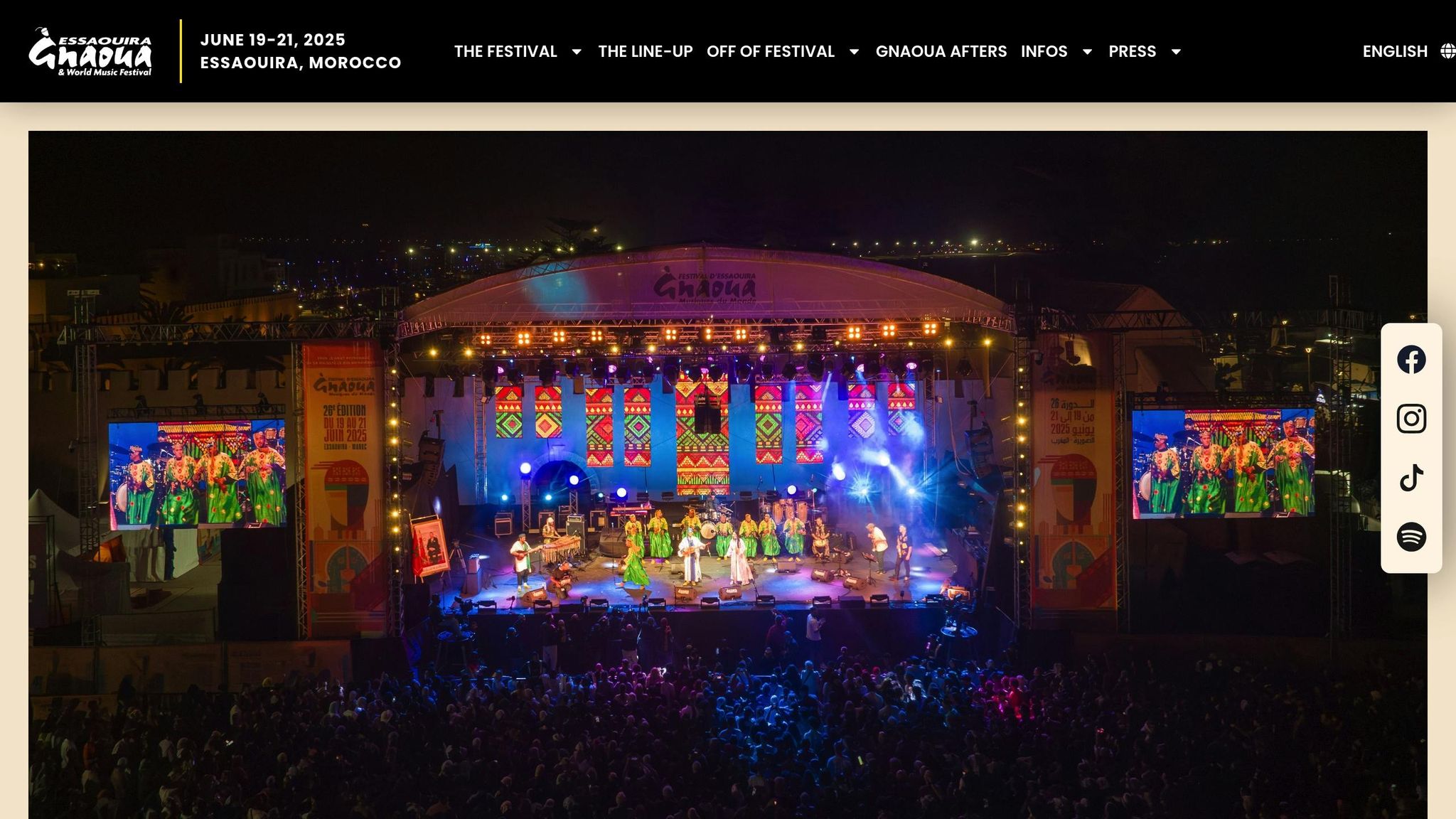
The Gnaoua World Music Festival, held in the charming coastal town of Essaouira, is a celebration of Morocco’s spiritual Gnawa music. Established in 1998 by Neila Tazi and her A3 Groupe, the festival has become a beacon for this unique musical tradition, blending it with global sounds. A defining moment came in 2003, when jazz legend Randy Weston spotlighted Gnawa music as a spiritual cornerstone of African-American jazz, further cementing its global significance.
Festival National des Arts Populaires (Marrakech)
The Festival National des Arts Populaires (FNAP) is a vibrant tribute to Morocco’s folk traditions. Unlike festivals focused on international acts, FNAP shines a light on the country’s rich cultural heritage. With over 300 performers – including Berber storytellers, dancers, acrobats, and singers – the festival brings together artists representing 21 different Berber dialects.
Beyond music, FNAP immerses attendees in storytelling, dance, and acrobatics, offering a full sensory experience of Morocco’s cultural roots. Tickets are incredibly affordable, starting at just 100 MAD (about $10). As one observer put it, each troupe tells its own story, preserving and sharing the traditions of their heritage (Guardian of a Riad). Established artists also speak highly of the festival, with Khadija El Warzaziya praising the 2025 edition as "amazing, too beautiful, too perfect".
Moroccan Music Styles at Festivals
Morocco’s music festivals are a vibrant celebration of the country’s rich musical heritage, blending centuries-old traditions with modern innovations. These events offer a deep dive into the diverse sounds that define Moroccan culture, from spiritual rhythms to contemporary beats. Each musical style plays a unique role, adding layers of meaning and excitement to the festival experience. Let’s explore a few of the standout styles, starting with the iconic Gnawa tradition.
Gnawa: Spiritual Rhythms and Trance Music
Gnawa music holds a special place in Moroccan festivals, particularly at the renowned Gnaoua World Music Festival in Essaouira. This genre is rooted in hypnotic rhythms, created by instruments like the qraqeb (metal castanets) and the sintir (a three-stringed bass lute). These sounds are designed to evoke trance-like states, often linked to healing and spiritual connection. Gnawa music intertwines traditional African rhythms with Islamic spiritual practices, creating a deeply soulful experience.
What sets Gnawa apart at festivals is its ability to blend the old with the new. Modern musicians frequently collaborate with Gnawa masters, producing fusion pieces that stay true to the tradition while appealing to global audiences. The genre’s call-and-response patterns and improvisational style have even influenced jazz artists worldwide, making it a bridge between Morocco’s musical past and its global future.
Amazigh/Berber Folk Music
Amazigh music reflects the rich cultural heritage of Morocco’s indigenous Berber communities. At festivals like the Festival National des Arts Populaires in Marrakech, this style takes center stage, offering a glimpse into a world that predates Arabic influence in North Africa.
The sound of Amazigh music varies across Morocco’s regions. In the Atlas Mountains, performers use distinct vocal techniques and instruments like the bendir (frame drum) and oud (lute). Meanwhile, coastal Amazigh groups bring their own rhythmic styles and storytelling traditions, shaped by their unique environment.
Storytelling is a cornerstone of Amazigh music. Many songs serve as oral histories, recounting tales of ancient battles, seasonal rituals, and community wisdom. Performances often include intricate costumes and choreographed movements, transforming the music into a full cultural spectacle that immerses audiences in the richness of Amazigh life.
Contemporary Styles: Pop, Rap, and Jazz
While traditional music celebrates Morocco’s roots, contemporary genres highlight its dynamic evolution. Modern Moroccan festivals embrace styles like hip-hop, rap, and jazz, which resonate with younger audiences and reflect the country’s changing cultural identity. Moroccan hip-hop artists often tackle social issues, blending Arabic, French, and Berber languages to create a sound that’s distinctly Moroccan.
Jazz fusion is another standout at major festivals like Mawazine. Moroccan jazz musicians weave traditional scales and rhythms into modern jazz compositions, creating a sound that feels both familiar and fresh.
Electronic music has also made its mark on Morocco’s festival scene. DJs and producers often sample traditional Moroccan sounds, reimagining them for dance floors. This fusion bridges ancient musical traditions with global club culture, drawing in local youth and international fans alike.
What makes Morocco’s music festivals so special is the way these styles interact and inspire one another. You might hear a rapper layering Gnawa rhythms into their beats or see an Amazigh group collaborating with jazz musicians. This blending of genres creates a dynamic and ever-changing soundscape, ensuring that every festival offers something unexpected and unforgettable.
sbb-itb-fa26f1f
First-Time Visitor Guide
Planning ahead is essential for American travelers looking to fully enjoy Morocco’s vibrant music festivals. These events offer a fascinating mix of tradition and modernity, but Morocco’s unique climate, customs, and festival logistics require some preparation to ensure a smooth and unforgettable experience.
Trip Planning Basics
- Book early: Festivals like the Gnaoua World Music Festival in Essaouira or Mawazine in Rabat draw big international crowds, so flights, hotels, and festival tickets can sell out fast. Consider bundling these through a travel agency that specializes in Moroccan trips – they might help you snag better deals.
- Time your visit wisely: Some festivals, such as Mawazine, take place during cooler seasons, while events like the Festival National des Arts Populaires in Marrakech may happen in the summer heat. If you’re visiting during warmer months, make sure your accommodations have air conditioning.
- Check your travel documents: U.S. citizens don’t need a visa for short stays, but your passport must be valid for several months beyond your trip. You’ll also need to fill out entry forms, and customs lines can be long during peak travel times.
- Budget smartly: Set aside funds for unexpected costs, and notify your bank about your international travel plans to avoid issues with your credit or debit cards.
Once your travel plans are in place, it’s time to think about what to pack.
Packing Checklist
- Stay sun-smart: Bring high-SPF sunscreen, a wide-brimmed hat, quality sunglasses, and lightweight, long-sleeved shirts to protect yourself from the sun while staying cool.
- Dress modestly: Morocco’s cultural norms lean toward modest attire. Lightweight pants or long skirts are great options, and a light jacket will come in handy for cooler evenings.
- Festival must-haves: Pack comfortable walking shoes, a small backpack, a portable phone charger, earplugs, and a small towel. These will make long festival days much more manageable.
- Health essentials: Don’t forget your prescription medications in their original containers, along with extras. Add hand sanitizer, tissues, and a basic first-aid kit to your bag.
After packing, it’s worth learning a bit about local customs to ensure smooth interactions during your trip.
Local Customs and Etiquette
- Respect cultural norms: While festivals encourage audience participation – especially during Gnawa performances – public displays of affection aren’t common in Morocco, so it’s best to keep them minimal.
- Language basics: Arabic and Berber are Morocco’s official languages, but French is widely spoken, and many younger Moroccans in tourist areas also speak English. Knowing a few phrases like shukran (thank you) and marhaba (hello) can go a long way.
- Handle money wisely: Morocco’s currency is the dirham (MAD). Bargaining is common in markets but not in restaurants or official festival venues. Check current exchange rates before you go.
- Photography etiquette: Always ask permission before taking photos of people, especially those in traditional dress or during spiritual moments. Look out for signs indicating photography restrictions at certain venues.
- Stay safe: Keep valuables secure, carry only what you need for the day, drink bottled water, and familiarize yourself with the locations of medical tents or first-aid stations at the festival.
With thoughtful preparation and an open mind, you’ll be ready to dive into Morocco’s incredible music festivals. From the rhythmic beats of Gnawa to the lively energy of Mawazine, these events promise an unforgettable cultural experience.
Conclusion
Morocco’s music festivals are a vibrant mix of age-old traditions and modern creativity, offering unforgettable experiences. From the soulful beats of Gnawa spiritual music to the energetic pulse of Moroccan hip-hop, these festivals unfold against stunning backdrops – whether it’s the coastal beauty of Essaouira or the lively streets of Marrakech.
Main Points Summary
The guide explored three standout festivals, each delivering something special for travelers from the U.S. Mawazine, hosted in Rabat and Salé, is one of the largest music festivals in North Africa, showcasing a wide variety of artists. The Gnaoua World Music Festival in Essaouira provides a more intimate setting, celebrating spiritual and traditional music. Meanwhile, Marrakech’s Festival National des Arts Populaires dives deep into Morocco’s folk heritage, highlighting the country’s rich artistic roots.
Getting to know Morocco’s musical traditions adds depth to the festival experience, bridging the gap between ancient culture and modern sounds that reimagine those traditions.
Prepare ahead of time – pack thoughtfully, plan for long days, and learn about local customs to ensure a smooth and enjoyable adventure. With that, you’re ready to immerse yourself in Morocco’s vibrant festival scene.
Start Planning Your Visit
Now’s the time to start planning. Morocco’s music festivals provide U.S. travelers with a unique opportunity to engage with North African culture in a way that goes beyond the usual tourist itinerary. Whether your heart is drawn to the spiritual power of Gnawa music, the dynamic energy of contemporary genres, or the timeless allure of Berber folk traditions, each festival offers a rare connection between Morocco’s past and present.
The festival season typically spans late spring to early fall, with each time of year offering its own charm. Summer festivals, like those in Marrakech, embrace the region’s intense heat, while spring and fall events often provide milder weather for outdoor enjoyment.
Start by selecting the festival that aligns with your musical tastes and travel style, then build your trip around it. Many visitors pair a music festival with stops at Morocco’s imperial cities, the Atlas Mountains, or even the Sahara Desert for a well-rounded cultural journey.
Whether you find yourself swaying to the hypnotic rhythms of Gnawa music or discovering up-and-coming Moroccan artists, these festivals promise memories that will stick with you forever. They’re not just about music – they’re about stepping into Morocco’s rich cultural tapestry and experiencing it firsthand.
FAQs
What are some essential tips for first-time attendees of Moroccan music festivals?
For anyone heading to a Moroccan music festival for the first time, a little preparation can go a long way in ensuring a smooth and enjoyable experience. Start with your wardrobe: dress modestly out of respect for local traditions, especially if the festival happens during a religious period. While lightweight clothing will keep you comfortable in the warm daytime heat, don’t forget to pack a jacket or sweater for those cooler evenings.
Bring along some essentials to keep yourself comfortable throughout the day. Items like water, wet wipes, hand sanitizer, and sunscreen are must-haves. Staying hydrated and protected from the sun is crucial. Also, take a close look at the festival schedule ahead of time so you don’t miss out on any of the performances you’re excited about.
Finally, spend some time learning about Moroccan customs and traditions. It’s a simple way to deepen your connection to the country’s vibrant culture and make the most of your festival experience.
How have Moroccan music festivals grown to attract global attention?
Moroccan music festivals have evolved significantly, weaving together age-old traditions and modern sounds to attract audiences from across the globe. Back in 1959, the National Festival of Popular Arts set the stage by spotlighting traditional Berber music and dance. These early events were a tribute to Morocco’s vibrant cultural roots, shaped by Berber, Arab, and French influences.
Fast forward to today, festivals like the Gnaoua World Music Festival in Essaouira and Mawazine in Rabat have taken things to a whole new level. These gatherings feature a dynamic mix of genres, from the hypnotic beats of traditional Gnaoua music to the energy of contemporary global artists. By blending local heritage with international appeal, Morocco has carved out a prominent spot on the global music scene.
Why is Gnawa music so important in Moroccan festivals, and how has it influenced other music styles?
Gnawa Music: A Blend of History and Spirituality
Gnawa music holds a cherished spot in Moroccan festivals, serving as a vibrant expression of the country’s deep-rooted heritage and spiritual traditions. Originating from the history of West African communities who were brought to Morocco, this musical form weaves together hypnotic rhythms, soulful chants, and the resonant tones of the Guembri – a three-stringed bass lute. More than just music, Gnawa performances are steeped in spirituality, often linked to Sufi rituals, creating an experience that is as much about connection and meaning as it is about sound.
What’s remarkable is how Gnawa music has left its mark far beyond Morocco’s borders. Its intricate rhythms and melodies have sparked creativity across genres like jazz, blues, and even modern electronic music. Musicians around the world continue to draw inspiration from its elements, blending tradition with modernity. This enduring influence positions Gnawa as not just a cultural treasure but also a dynamic force in global music, bridging the past and the present in extraordinary ways.



